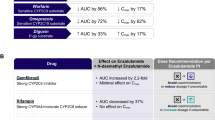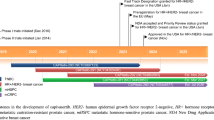Abstract
Introduction
Based on the observation of beneficial effects on cancer metabolism, microenvironment, or VEGF-signaling, several non-anticancer drugs have been discussed as useful in renal cell carcinoma (RCC). In the present study, we investigated the prognostic impact of concomitant medication in RCC and correlated comedication with cell-cycle and proliferation activity in corresponding surgical specimen.
Methods
A total of 388 patients who underwent surgery for localized RCC were included. The individual medication was evaluated according to substance classes. Tissue microarrays from corresponding tumor specimen were immunohistochemically (IHC) stained for Cyclin D1 and Ki67 and semi-quantitatively evaluated. Uni- and multivariate analyses were used to compare survival outcomes. For the comparison of IHC expression according to medication subgroups, Kruskal–Wallis analysis was performed.
Results
Median follow-up was 57.93 months (95% CI 53.27–69.43) and median OS accounted for 181.12 months (129.72–237.17). Univariate analysis identified pathological standard variables (T-stage > T2, Grading > G2, L1, N1, M1, sarcomatoid subtype, necrosis) as significant determinants of OS. Moreover, statin use (p = 0.009) and sartan use (p = 0.032) were significantly associated with improved OS. Multivariate analysis identified M1-stage (p < 0.001), statin and sartan use (p = 0.003 and p = 0.033, respectively) as independent prognosticators of survival. Expression of Ki67 was significantly reduced in patients with statin use (p = 0.013), while Cyclin D1 expression showed no correlation with comedication.
Conclusions
Concomitant intake of statins and sartans identifies as an independent predictor of OS in RCC, and reduced Ki67 expression was significantly associated with statin use. Further evaluation of drug repurposing approaches with these substances in RCC appear warranted.



Similar content being viewed by others
References
Araujo WF, Naves MA, Ravanini JN, Schor N, Teixeira VP (2015) Renin-angiotensin system (RAS) blockade attenuates growth and metastatic potential of renal cell carcinoma in mice. Urol Oncol 33:389. https://doi.org/10.1016/j.urolonc.2014.11.022 (e381–387)
Cooper-DeHoff RM, Johnson JA (2016) Hypertension pharmacogenomics: in search of personalized treatment approaches. Nat Rev Nephrol 12:110–122. https://doi.org/10.1038/nrneph.2015.176
Feldt M et al (2015) Statin-induced anti-proliferative effects via cyclin D1 and p27 in a window-of-opportunity breast cancer trial. J Transl Med 13:133. https://doi.org/10.1186/s12967-015-0486-0
Ferlay J et al (2013) Cancer incidence and mortality patterns in Europe: estimates for 40 countries in 2012. Eur J Cancer 49:1374–1403. https://doi.org/10.1016/j.ejca.2012.12.027
Hamilton RJ et al (2014) The association between statin medication and progression after surgery for localized renal cell carcinoma. J Urol 191:914–919. https://doi.org/10.1016/j.juro.2013.10.141
Kaffenberger SD et al (2015) Statin use is associated with improved survival in patients undergoing surgery for renal cell carcinoma. Urol Oncol 33:21. https://doi.org/10.1016/j.urolonc.2014.10.007 (e11–21, e17)
Kitzmiller JP, Mikulik EB, Dauki AM, Murkherjee C, Luzum JA (2016) Pharmacogenomics of statins: understanding susceptibility to adverse effects. Pharmgenom Pers Med 9:97–106. https://doi.org/10.2147/PGPM.S86013
Kononen J et al (1998) Tissue microarrays for high-throughput molecular profiling of tumor specimens. Nat Med 4:844–847
Lever AF et al (1998) Do inhibitors of angiotensin-I-converting enzyme protect against risk of cancer? Lancet (London, England) 352:179–184. https://doi.org/10.1016/S0140-6736(98)03228-0
Liu Z, Fang H, Reagan K, Xu X, Mendrick DL, Slikker W Jr, Tong W (2013) In silico drug repositioning: what we need to know. Drug Discov Today 18:110–115. https://doi.org/10.1016/j.drudis.2012.08.005
Ljungberg B et al (2015) EAU guidelines on renal cell carcinoma: 2014 update. Eur Urol 67:913–924. https://doi.org/10.1016/j.eururo.2015.01.005
Luo H, Li M, Wang S, Liu Q, Li Y, Wang J (2018) Computational drug repositioning using low-rank matrix approximation and randomized algorithms. Bioinformatics 34:1904–1912. https://doi.org/10.1093/bioinformatics/bty013
Meissner MA, McCormick BZ, Karam JA, Wood CG (2018) Adjuvant therapy for advanced renal cell carcinoma. Expert Rev Anticancer Ther. https://doi.org/10.1080/14737140.2018.1469980
Miyajima A et al (2015) Prognostic impact of renin-angiotensin system blockade on renal cell carcinoma after surgery. Ann Surg Oncol 22:3751–3759. https://doi.org/10.1245/s10434-015-4436-0
Mosshammer D, Schaeffeler E, Schwab M, Morike K (2014) Mechanisms and assessment of statin-related muscular adverse effects. Br J Clin Pharmacol 78:454–466. https://doi.org/10.1111/bcp.12360
Nayan M, Finelli A, Jewett MAS, Juurlink DN, Austin PC, Kulkarni GS, Hamilton RJ (2016) Statin use and kidney cancer outcomes: a propensity score analysis. Urol Oncol 34:487. https://doi.org/10.1016/j.urolonc.2016.06.007 (e481–487, e486)
Needham M, Mastaglia FL (2014) Statin myotoxicity: a review of genetic susceptibility factors. Neuromuscul Disord 24:4–15. https://doi.org/10.1016/j.nmd.2013.09.011
Nielsen SF, Nordestgaard BG, Bojesen SE (2012) Statin use and reduced cancer-related mortality. N Engl J Med 367:1792–1802. https://doi.org/10.1056/NEJMoa1201735
Ramsey LB et al (2014) The clinical pharmacogenetics implementation consortium guideline for SLCO1B1 and simvastatin-induced myopathy: 2014 update. Clin Pharmacol Ther 96:423–428. https://doi.org/10.1038/clpt.2014.125
Relling MV, Evans WE (2015) Pharmacogenomics in the clinic. Nature 526:343–350. https://doi.org/10.1038/nature15817
Scharfe CPI, Tremmel R, Schwab M, Kohlbacher O, Marks DS (2017) Genetic variation in human drug-related genes. Genome Med 9:117. https://doi.org/10.1186/s13073-017-0502-5
Sorich MJ, Kichenadasse G, Rowland A, Woodman RJ, Mangoni AA (2016) Angiotensin system inhibitors and survival in patients with metastatic renal cell carcinoma treated with VEGF-targeted therapy: a pooled secondary analysis of clinical trials. Int J Cancer 138:2293–2299. https://doi.org/10.1002/ijc.29972
Sun M et al (2018) Adjuvant vascular endothelial growth factor-targeted therapy in renal cell carcinoma: a systematic review and pooled analysis. Eur Urol. https://doi.org/10.1016/j.eururo.2018.05.002
Vassy JL, Chun S, Advani S, Ludin SA, Smith JG, Alligood EC (2018) Impact of SLCO1B1 pharmacogenetic testing on patient and healthcare outcomes: a systematic review. Clin Pharmacol Ther. https://doi.org/10.1002/cpt.1223
Viers BR et al (2015) The association of statin therapy with clinicopathologic outcomes and survival among patients with localized renal cell carcinoma undergoing nephrectomy. Urol Oncol 33(388):e311–e388. https://doi.org/10.1016/j.urolonc.2015.01.009
Yang C, Zhang J, Ding M, Xu K, Li L, Mao L, Zheng J (2018) Ki67 targeted strategies for cancer therapy. Clin Transl Oncol 20:570–575. https://doi.org/10.1007/s12094-017-1774-3
Funding
This study was supported in part by the Robert Bosch Stiftung Stuttgart, the Horizon 2020-PHC-2015 grant U-PGx 668353, and the ICEPHA Graduate School Tuebingen-Stuttgart.
Author information
Authors and Affiliations
Corresponding author
Ethics declarations
Conflict of interest
E. N., P. K., K. F., M.Sc., E. S., M.Sw., F. F., J. B., S. K., J. H., A.S., and S. R. have no conflicts of interest to declare.
Research involving human and animal participants
All procedures performed in studies involving human participants were in accordance with the ethical standards of the institutional and/or national research committee and with the 1964 Helsinki declaration and its later amendments or comparable ethical standards.
Ethical approval
The study was approved by the institutional ethical review board (no. 078/2012B02).
Informed consent
Written informed consent was obtained from all participants.
Additional information
Publisher's Note
Springer Nature remains neutral with regard to jurisdictional claims in published maps and institutional affiliations.
Rights and permissions
About this article
Cite this article
Neumann, E., Klaiber, P., Freitag, K. et al. Assessment of concomitant non-oncologic medication in patients with surgically treated renal cell carcinoma: impact on prognosis, cell-cycle progression and proliferation. J Cancer Res Clin Oncol 145, 1835–1843 (2019). https://doi.org/10.1007/s00432-019-02914-2
Received:
Accepted:
Published:
Issue Date:
DOI: https://doi.org/10.1007/s00432-019-02914-2




